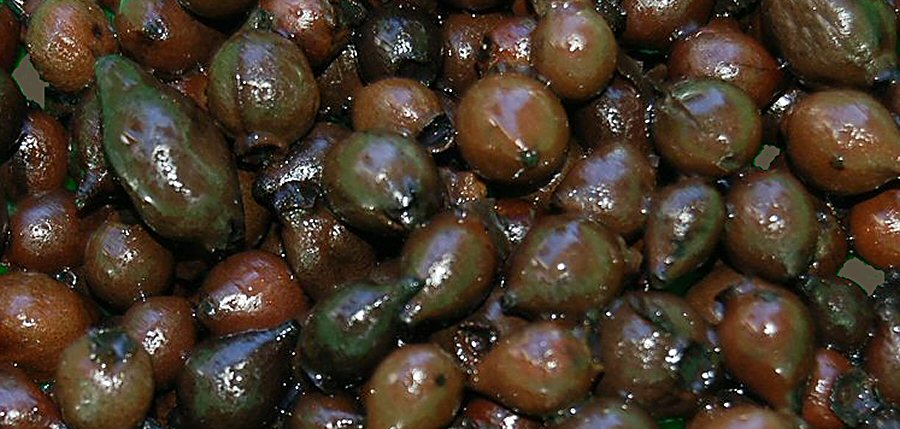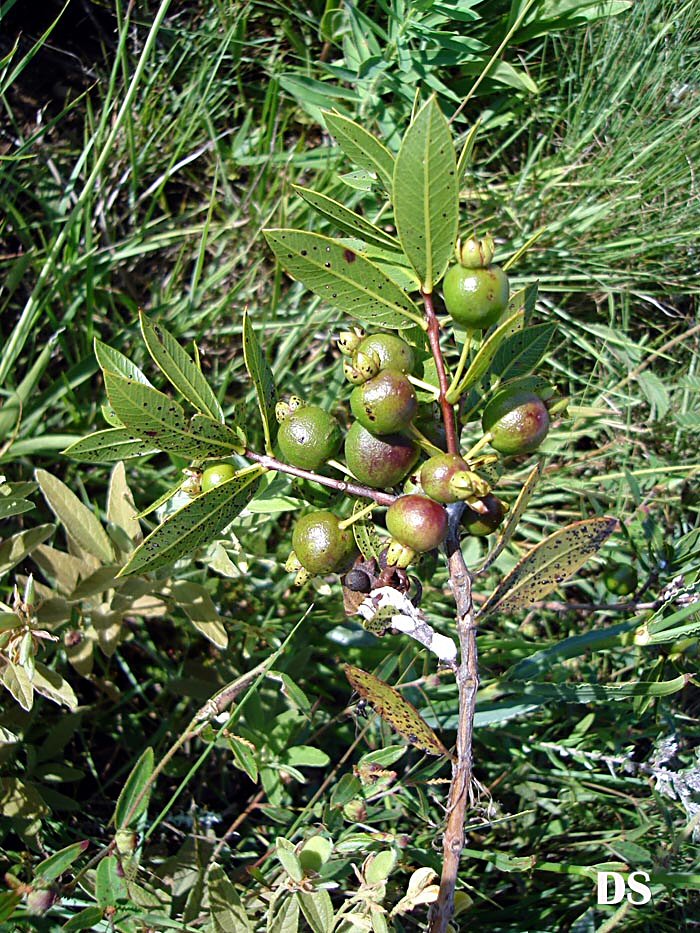
Guayabita del Pinar
The scientific name of the fruit used in the production of Guayabita del Pinar is Psidium salutare (or Araca Rasteiro), a species that belongs to the Myrtacea family. It is a low-growing, creeping shrub that grows up 50 to 230 centimeters tall and with a stem diameter of up to 10 cm, carpeting the ground.
It is found in Central America and the Caribbean. In Cuba it can be found in Pinar del Río and the Isla de la Juventud in pine forests on ferralitic, quartzitic soils, making it suitable for cultivation between 200 to 1.000 meters above sea level. With standing frost down to -6°C and enduring up to 5 months of drought, this resilient plant bears fruit from February to May.
Planting is best done in well-drained, fertile soil, either directly in the soil or in pots, with a recommended spacing of 2 meters. Once established, minimal care is needed, with periodic weeding and organic fertilization sustaining its growth.
Its flowering occurs from February to June and is usually solitary shrub with white petals 6 to 7 millimeters long. Its fruit are sub globose berries up to 1,5 centimeters in diameter, 0,9 to 1,8 grams in weight, and green in color. When ripe, they are edible and have an average of 4 seeds, although fruits with more than 12 and some with only one can be found.
It is poor in nutrients.
About a century ago, this species occupied savannas and semi-savannahs in pine forest areas, but due to the economic and social development of rural areas in Cuba and the intensive management of forests, it has been displaced to inaccessible places. This caused a change in its biotype and consequently a decrease in its populations.
Guayabita means “little guava.” First, these little guavas are macerated for at least 2 months in sugar cane alcohol to obtain Guayabita del Pinar Rum. After this fermentation process, sweet and fruity syrup is formed. During the bottling process, the fruity flavor of the syrup is enhanced by the presence of a small fruit in each bottle.
There are two types of Guayabita del Pinar, dry and sweet. The far more common type is the dry, which is just like rum. The background of the label is white, and the banner is a deep pink. You can get this at many liquor stands and shops and at the Duty Free shops in Cuban airports.
The other, more unique one is a called Guayabita del Pinar Dulce. It’s sweet, like a liqueur. This bottle has the reverse color scheme, white banner against a deep pink background, and you can see this only in Pinar del Rio region (its production was discontinued in 2019).
Not only has its incredible flavor brought it worldwide recognition, but the name of the drink is also that of a well-known song, of the musical genre Son, written by Cándido Fabré, singer and director of the Cuban orchestra La Original de Manzanillo in 90s.
The scientific name of the fruit used in the production of Guayabita del Pinar is Psidium salutare (or Araca Rasteiro), a species that belongs to the Myrtacea family. It is a low-growing, creeping shrub that grows up 50 to 230 centimeters tall and with a stem diameter of up to 10 cm, carpeting the ground.
It is found in Central America and the Caribbean. In Cuba it can be found in Pinar del Río and the Isla de la Juventud in pine forests on ferralitic, quartzitic soils, making it suitable for cultivation between 200 to 1.000 meters above sea level. With standing frost down to -6°C and enduring up to 5 months of drought, this resilient plant bears fruit from February to May.
Planting is best done in well-drained, fertile soil, either directly in the soil or in pots, with a recommended spacing of 2 meters. Once established, minimal care is needed, with periodic weeding and organic fertilization sustaining its growth.
Its flowering occurs from February to June and is usually solitary shrub with white petals 6 to 7 millimeters long. Its fruit are sub globose berries up to 1,5 centimeters in diameter, 0,9 to 1,8 grams in weight, and green in color. When ripe, they are edible and have an average of 4 seeds, although fruits with more than 12 and some with only one can be found.
It is poor in nutrients.
About a century ago, this species occupied savannas and semi-savannahs in pine forest areas, but due to the economic and social development of rural areas in Cuba and the intensive management of forests, it has been displaced to inaccessible places. This caused a change in its biotype and consequently a decrease in its populations.
Guayabita means “little guava.” First, these little guavas are macerated for at least 2 months in sugar cane alcohol to obtain Guayabita del Pinar Rum. After this fermentation process, sweet and fruity syrup is formed. During the bottling process, the fruity flavor of the syrup is enhanced by the presence of a small fruit in each bottle.
There are two types of Guayabita del Pinar, dry and sweet. The far more common type is the dry, which is just like rum. The background of the label is white, and the banner is a deep pink. You can get this at many liquor stands and shops and at the Duty Free shops in Cuban airports.
The other, more unique one is a called Guayabita del Pinar Dulce. It’s sweet, like a liqueur. This bottle has the reverse color scheme, white banner against a deep pink background, and you can see this only in Pinar del Rio region (its production was discontinued in 2019).
Not only has its incredible flavor brought it worldwide recognition, but the name of the drink is also that of a well-known song, of the musical genre Son, written by Cándido Fabré, singer and director of the Cuban orchestra La Original de Manzanillo in 90s.
